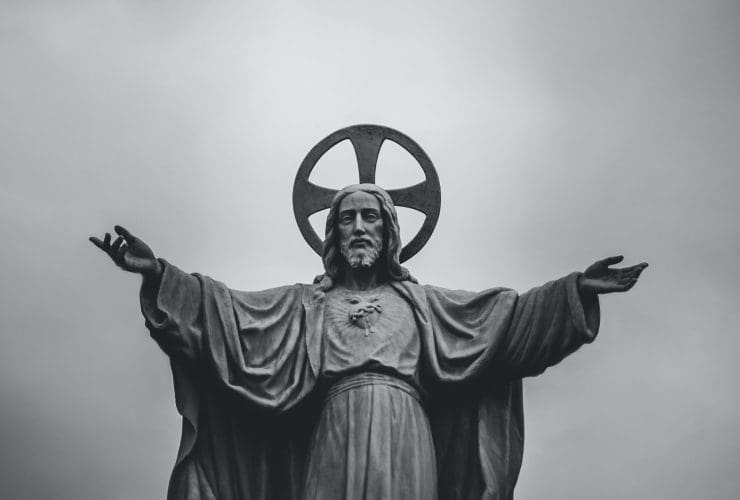Q:
“1 Thessalonians chapter 4, in referring to the second coming, states “and the dead in Christ will rise first”. I am confused because in Luke 23 Jesus told the thief on the cross “today you will be with me in paradise.” Is there a way to reconcile this difference?”
Louise
Hello Louise, when I was a youth pastor at Rod’s church, I was asked a very similar question. The dilemma for the youth at the time was that the Bible is contradicting itself: How can Jesus say “Truly, I say to you, today you will be with me in paradise” (Luke 23:43) and then ascend three days later. Clearly, that is not “today”! In a similar way, how can Paul say, “the dead in Christ will rise first” (1 Thessalonians 4:16) if Jesus said “today”. Christ is, after all, also called the “firstborn from the dead” (Revelation 1:5; 1 Corinthians 15:20).
Without getting too deep into the metaphysical weeds or theological frameworks on the afterlife, I think there is a more pragmatic answer to this question. While using the word today can refer to a 24-hour timeframe or while there is daylight, the word today can also be used to indicate “starting now”. In other words, “Truly, I say to you, [starting] today you will be with me in paradise”. We know this to be spiritually true. When Christ died on that cross, He defeated death. The thief understood his punishment was just and sincerely believed unto Christ as Lord. To add to this point, after Jesus said, “today you will be with me in paradise,” He calls out in a loud voice and says, “Father, into your hands I commit my spirit!” (v.46) In other words, both Jesus and the thief died that day and were committed to the Father.
Now, for those who struggle with how this metaphysically works, it is important that we know our place in the cosmos. We are not God. This is a mystery that is going to be revealed in due time. We must rest our understanding on God, not ourselves. This is spiritually healthy for us to do––we do not need to know everything.
I know some speculate that this passage requires “soul sleep” to be true for it to make any sense. I will touch on this briefly. While it does not say that the thief would be awake or conscious with the Father in heaven, it does say that his spirit would be securely with God in the afterlife (John 6:39; Psalm 16:10). Being awake and alive share typological imagery, just like light and life do, so the issue comes in with our understanding: If the soul/spirit enliven the body, and the thief is saved for the resurrection when “the dead in Christ will rise first”, in which the thief’s mortal body will be restored on that Day of Christ’s return (Romans 8:10-11), how then can one be awake without a body, especially if the resurrection has not happened yet?
Soul Sleep or Present with the Lord?
I’m not going to delve into this “soul sleep” versus “present with the Lord” debate (2 Corinthians 5:8). What I will say is that from God’s vantage point, it doesn’t really make a difference; the spiritual world doesn’t operate like our world. But from our earthly vantage point, soul sleep may seem to make a lot of sense, practically speaking, given our temporal limitations and earthly restrictions within an ‘arrow of time’. After all, Paul refers to the saints who have fallen asleep after Christ’s ascension:
“For since we believe that Jesus died and rose again, even so, through Jesus, God will bring with him those who have fallen asleep. For this we declare to you by a word from the Lord, that we who are alive, who are left until the coming of the Lord, will not precede those who have fallen asleep.” (1 Thessalonians 4:14-15)
But, I believe, Paul is be speaking metaphorically, or in the vein of the Old Testament Scriptures, about those who have “fallen asleep” because that is how we see things from our perspective, not how it is in heaven necessarily. Sleep (and rest) is often used as a symbolic allusion and prophetic parallel for death throughout Scripture for the obvious image of looking lifeless while asleep and waking up one Day (1 Kings 2:10; Psalm 13:3; Jeremiah 51:39, 57; Daniel 12:2; Matthew 9:24; John 11:11-14; Acts 7:59-60; 1 Corinthians 15:6, 20; Ephesians 5:14). Like actual sleep, when you wake up it feels like no time has passed, yet you are rested. Since all those in Christ await the resurrection of their mortal bodies, those who have fallen asleep are truly alive and more awake than ever in Christ––however that works, I do not pretend to know. The Transfiguration gives us a glimpse of their potential state in heaven:
“Now Peter and those who were with him were heavy with sleep, but when they became fully awake they saw his glory and the two men who stood with him.” (Luke 9:32)
Also, in Matthew, those fallen who have asleep awaken and witness about Christ:
“The tombs also were opened. And many bodies of the saints who had fallen asleep were raised, and coming out of the tombs after his resurrection they went into the holy city and appeared to many.” (Matthew 27:52-53)
While “sleep” may indicate the actual state of a person’s soul before Christ’s ascension (cf. 1 Samuel 28:15), in Christ this has all changed. He went down into the realm of the dead (that is, Sheol in Hebrew and Hades in Greek) and preached the good news (1 Peter 3:18-20), the “Harrowing of Hell” as it is known. Somehow those in Christ are conscious and aware, yet await the redemption of their flesh (Luke 16:19-31; Revelation 6:9-11). We can speculate all we want about whether this is a dream-like state until we put on imperishable bodies, redeemed and glorified, we just do not know. Being awake and alive share typological imagery, which should not be ignored.
All that to say; we do not understand how the spiritual realm works, so we speak in terms we can understand (1 Corinthians 13:9-10). And if we cannot grasp heaven in earthly terms, then we cannot speak of heaven in heavenly terms. This is beyond our understanding (cf. 2 Corinthians 12:1-4). Humility is advised. It is a mystery that will be revealed on the Day of His return, but I digress.
The metaphorical use of sleep also has strong ties with the metaphorical use of “rest”. The word rest is often associated with a righteous person who dies will have peaceful rest in God (Isaiah 57:1-2; Matthew 11:28-30) whereas evil and wickedness is often associated with being “restless” (Genesis 4:12, 14; Matthew 12:43; James 3:8). It also has significance in relation to the new heavens and new earth. Finding conscious rest in Christ has profound theological and eschatological symbolism when comparing the Israelite wilderness wandering to the new creation to come, where only those who believed God’s word entered the Promised Land and were given God’s rest. Like the Promise Land, God promises to give ultimate rest in Paradise to those who believe in Him (Revelation 14:13; Acts 3:20-21; Hebrews 4:1-11; Exodus 33:14; Hebrews 3:7-11, 18-19; Psalm 95:7-11).
So––rest assured! Whether the thief is awake or resting in the Lord, he was still saved by Christ on the day he died.
I hope that resolves your dilemma, Louise, and gives you some extra food for thought. God Bless you today!

Matlock Bobechko is the Chief Operating/Creative Officer of Bible Discovery. He is an eclectic Christian thinker and writer, award-winning screenwriter and short filmmaker. He writes a blog on theology, apologetics, and philosophy called Meet Me at the Oak. He is also an Elder at his local church.






